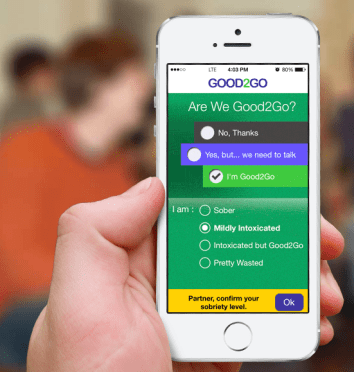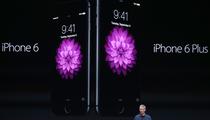There is Now a "Mutual Consent" App
Monday, September 29, 2014 - 01:06 PM
 (Good2Go)
(Good2Go)
An app was released last week that allows potential partners to
record their consent to sex prior to having it, as well as their level
of intoxication at the time they consent.
Yeah, it's exactly what it sounds like. If you want to have sex
with someone, they use the app to answer "No Thanks," "Yes, but ... we
need to talk," or "I'm Good2Go." If your potential partner is, in fact,
Good2Go, they are sent to a second screen to indicate that they are
"Sober," "Mildly Intoxicated," "Intoxicated but Good2Go," or "Pretty
Wasted." Choosing "Pretty Wasted" nullifies this transaction by
informing the phone's owner that they "cannot consent" in this
circumstances.
The premise of the app is that it will make difficult converstaions about consent and relationship dynamics in a new sexual relationship. But Slate's Amanda Hess says it creates more problems than it solves:
Tech utopians think that there is no issue - social, medical, or otherwise - that tech can't solve, including rape. This is a good example of that instinct leading them astray. Consent requires communication, interaction, and engaging what can be subtle, and sometimes difficult issues that are specific to each relationship. Good2Go can't control for all of that.
(h/t Michael Hoffman)
The premise of the app is that it will make difficult converstaions about consent and relationship dynamics in a new sexual relationship. But Slate's Amanda Hess says it creates more problems than it solves:
Good2Go could contribute a dangerous new element to those he-said she-said rape cases. What Good2Go doesn’t tell users is that it keeps a private record of every “I’m Good2Go” agreement logged in its system, tied to both users’ personal phone numbers and Good2Go accounts. (Records of interactions where users say “No” or just want to talk are not logged in this way.) Allman says that regular users aren’t permitted access to those records, but a government official with a subpoena could. “It wouldn’t be released except under legal circumstances,” Allman told me. “But it does create a data point that there was an occasion where one party asked the other for affirmative consent, that could be useful in the future … there are cases, of course, as we know, where the accused is an innocent party, so in that case, it could be beneficial to him.”I like the idea of protecting men from false accusations. But this app doesn't seem like it will accomplish that. It essentially presents a consent binary that doesn't take into consideration intimidation, coercion, and plenty of other mitigating factors that make consent more complex than registering it on an app. The idea makes sense - if you introduce this thing in the middle of a sexual encounter, in good situations it will make implicit consent explicit, and in bad situations it will end the encounter entirely. But the real world is more complicated than a three step registration of consent.
Tech utopians think that there is no issue - social, medical, or otherwise - that tech can't solve, including rape. This is a good example of that instinct leading them astray. Consent requires communication, interaction, and engaging what can be subtle, and sometimes difficult issues that are specific to each relationship. Good2Go can't control for all of that.
(h/t Michael Hoffman)








